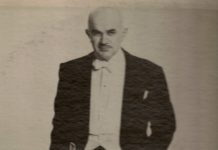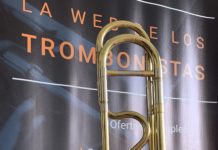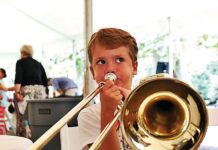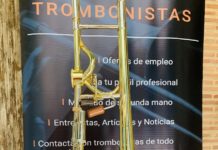David Pérez, is currently trombone professor at the Profesional Conservatory of Music of Teruel and has sent us this interesting article, in which he tells us in first person his experience interpreting the well-known trombone solo of Maurice Ravel’s Bolero.

STORIES OF A ”BOLO-ERO”.
At the beginning of the last week of March I received some Whatsapp audios from a friend offering to play Ravel’s ”Bolero” with the orchestra of his musical society at the concert that weekend. When I heard the offer I took it with great motivation, especially when the evolution of my musical career in recent years has been directed towards teaching, which presented me with one of the few opportunities I will have in my career to play this solo again (the only time I played it was in the Orchestra of the University of Valencia in my formative years, when I was 21-22 years old, more than ten years ago, where I remember having a pretty bad time).
So I got down to work and started preparing for that moment the next morning. A gentle warm-up and a study of, for me, the most important technical elements of that solo. I did the same thing the next morning, until I realised that I already knew the solo (the times I’ve studied it at home and played it in tests…), and that the only thing I had to face were the physical sensations produced by a solo of such calibre and responsibility. So more than studying playing, the days before the rehearsal I dedicated myself to working the solo without playing, to try to feel sensations of relaxation in the breath and in the movement of the air. I thought that if I could find those sensations studying in that way, I would do much better when I played it sitting on the chair of the orchestra.
So after this kind of study, the evening before the rehearsal (the rehearsal was the same morning as the concert, which would be at the end of the afternoon) I decided to listen to some versions of Youtube. Listening to Ian Bousfield’s version (almost nothing…) I suddenly noticed how my beats started to accelerate. I found it so surprising, yet significant, that I thought that anxiety control was another physical sensation that I had to work on before rehearsal to try to control it as best as possible. So I looked for the video of the entire concert to put me in situation, at the same time that I was studying the piece to know when the solo was played. I would fall short of explaining in words how my pulsations were little by little more until the moment of the solo just sitting on the sofa of my flat (another proof that this profession is another sport). So in the moment in which I interpreted only with air the solo emulating Bousfield I had the opportunity to apply the sensations of relaxation that I had been trying to find these days in the breath and in the air in a situation as close as possible to a real interpretation, with pulsations to a thousand. I sincerely believe that this is the best part of my personal study of the whole week.
Next morning I woke up around 8 a.m. I felt relaxed and calm. I tried to entertain myself in things I like, such as videos from the TV show “La Resistencia”, before breakfast and a shower. Then I warmed up to get to the rehearsal with my body activated. When I got there, I continued to warm up. I had good sensations, so I dedicated myself to practice what for me are the most outstanding technical aspects of the solo: the attack of the first Bb, the beginning of the first sentence to find the cantábile style and legato, and the transition to the mid-bass register of the last sentence to find the correct air velocity. I immediately realized that the solo intro is very important, the one that gives you that high when you notice that the attack has entered, and then continue to concentrate and with confidence. So before starting the rehearsal I did an exercise of attacks in the first Bb to find the rhythmic breathing and the action of the air and the tongue in the emission. I got a good result, which gave me confidence and security. This was helped by meeting well-known people, former classmates and co-workers and the good vibes in the group.
As I listened to the solos of the other instruments I was musically fed by them as I tried to enjoy their versions. This didn’t prevent my beats from going to more like the day before, but with the difference that, to my surprise, I was not being conditioned negatively. The exercise of the previous afternoon helped me to live with them at that moment, so when I played the solo, within that point of tension you have while playing, I managed to control that anxiety. From the result of that first session I am very satisfied except for a few details of tuning, I managed to control many of the sensations I had been experiencing throughout the week and I felt very confident.

You can listen to the version at this link: VÍDEO
After a first rehearsal of the whole work, the director decided to rehearse it again. It was something I wasn’t expecting, but I had to react to it immediately because after the first play I had released a lot of the adrenaline inside me. Just before the tuttis before the trombone solo, the director stopped the rehearsal and asked me if I wanted to play it again. So as to not do a discourtesy I said yes. Wrong. Wrong because, to be honest, I didn’t feel the need because I had found the sensations I wanted. Also, if the director asks a musician a question of this kind you have to answer it according to your own needs and, frankly, after spending the solo both as a soloist and in the tuttis, I didn’t have any need to play it again and carry more for the concert. What happened was that the preparation at the level of concentration was not the same as at the beginning of the rehearsal and, added to the relaxation and excessive confidence in which I fell after a good first pass, I did not take a good breath and failed the first attack, and later another note of the first sentence. The lesson was that, when faced with a situation of responsibility one cannot fall into relaxation and overconfidence no matter how much you control it, because that lack of activation or tension or whatever you want to call it plays a trick on you, especially when you don’t have the habit of sitting in a chair regularly as I do. However, instead of falling into a state of worry, I made an analysis of what happened and immediately erased those bad feelings from my memory. What was clear to me was that I had to keep the good ones and, in order to reinforce them, when I got home I made a pass without a trombone, taking good breaths and constantly moving the air and placing it according to the form of the phrasing.
As an anecdote, at the end of the rehearsal I learned that the concert was in the theater of the rival eternal society. These circumstances would have given a morbid feeling in the musical environment of the area in the central decades of the previous century. Like to play a Barça-Madrid in the field of the rival team or, to make a more realistic simile, that someone from Valencia or Atleti was loaned in one of those two teams to play that match in the field of the eternal rival. Luckily, these anecdotes are mere nonsense nowadays and, apart from the fact that I was not affected at all by such a circumstance, the musicians of both societies take these festivals and their musical rivalry in such a healthy way that these anecdotes do not lack their touch of humour.
After a break of several hours and moments of relaxation watching videos, I went to the concert. I did a warm-up similar to the one in the morning. I had good feelings. I was relaxed, I didn’t feel any stress at the mouth due to the morning rehearsal, so I predicted a good performance. Moments before entering the stage I relaxed talking with my partner the bass trombone, I tried to live those moments naturally, something that I think is fundamental in situations of responsibility. To be thinking about the solo or isolating yourself from the environment I don’t think it’s a good way to face a moment like that because you only manage to put pressure on yourself. Go ahead and touch. If it fails, it has failed and nothing happens. After all, the solo is controlled and doesn’t have to go wrong.
During the concert, the beats acted in the same way as in the rehearsal but with more intensity. But with the background I had acquired in the last few days, I controlled them better than I thought. If I found the breath I had been looking for all week to start the solo, I had more than half achieved. An exercise that I did during the previous solos is to look for it inside the trombone when throwing the water, doing it together with the rhythm established by the snare drum and the strings. I think it’s an activity that helps you relax while looking for the good breath within the rhythm of the piece. In fact, I managed to take a good breath at the beginning of the solo and the beginning was good. However, I noticed my lips a little open and that made me ”scratch” some notes.
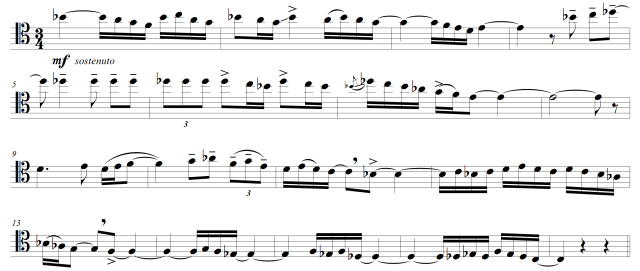
Here you have the link to the concert version:VÍDEO
When I finished, I had the feeling that I had fulfilled the responsibility that I had at the same time that I could have done a more polished interpretation in terms of security despite the fact that the style turned out to be musical. If I have to attribute something to these small details it is, on the one hand, not having reserved myself enough in the morning rehearsal, on the other hand, to the current lack of the habit of facing a stage on a weekly basis and situations of such caliber, very important when it comes to having the necessary tables to solve adversities in an outstanding way, and finally, I felt how performance falls in situations that you are not accustomed to facing. Perhaps a few years younger the body would have reacted better, but the experience I have acquired this week and everything I have learned is only possible in a state of maturity in which I find myself right now, where the important thing is not so much the result but the process I have done to find the best possible result.
David Pérez Zarzo.
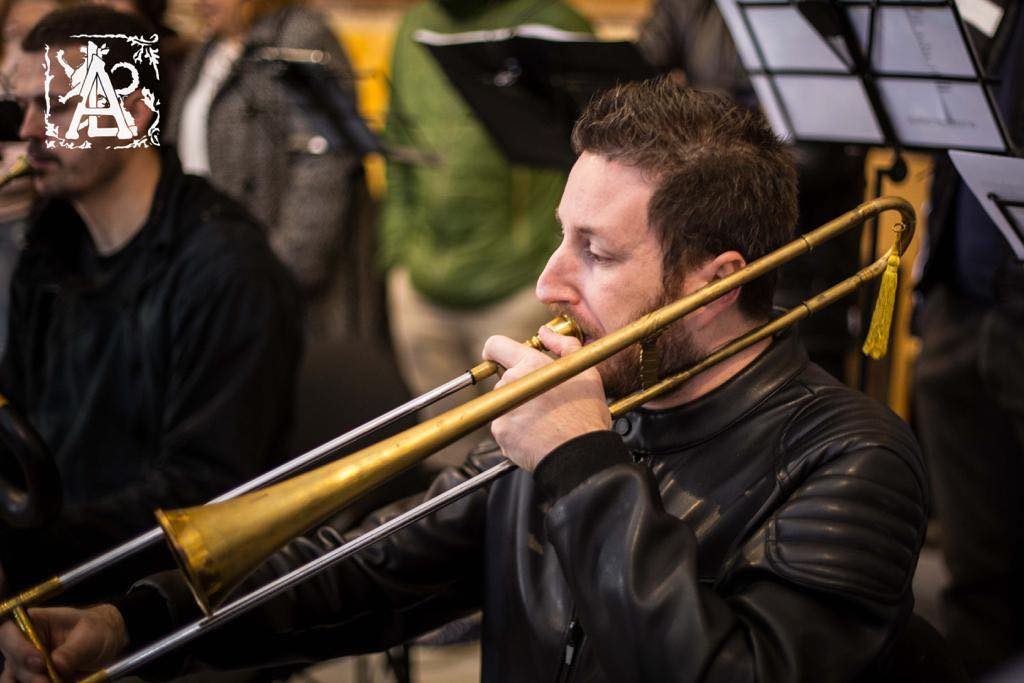
Profile of Luís Fred in Innovatrombone by clicking on the following link: David Pérez
If you are a trombonist, join the community by clicking on the following link:Register
Visit our webside:www.innovatrombone.com







